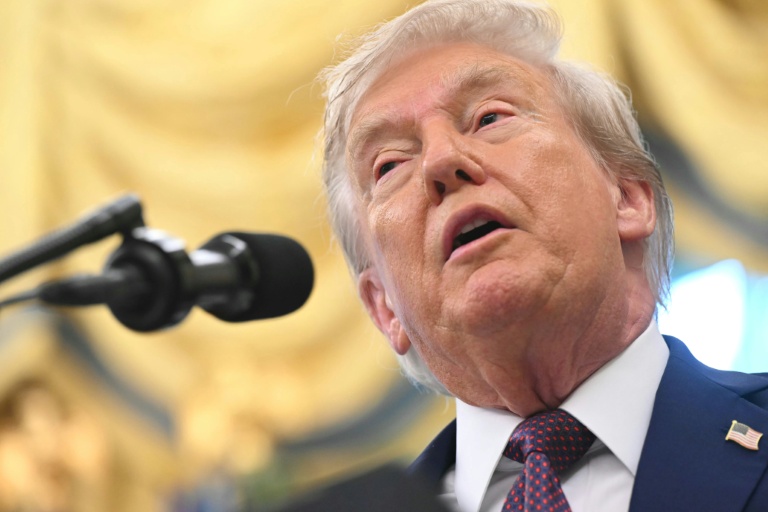Business
Trump Seeks Urgent Supreme Court Ruling on Tariff Legalities

US President Donald Trump announced on Tuesday his intention to request an expedited ruling from the Supreme Court regarding the legality of his administration’s tariffs. This move comes after a recent court ruling determined many of his tariffs were imposed illegally. “We’re going to be going to the Supreme Court, we think tomorrow, because we need an early decision,” Trump told reporters.
On October 6, 2023, the US Court of Appeals for the Federal Circuit delivered a 7-4 ruling affirming a lower court’s decision that Trump had exceeded his authority by invoking emergency economic powers to impose extensive tariffs. The court’s ruling allows these tariffs to remain in effect until mid-October, providing Trump a window to appeal to the Supreme Court.
Economic Implications and Stock Market Reactions
During his remarks, Trump expressed concern over the potential economic implications of the tariffs being overturned, claiming, “if you took away tariffs, we could end up being a third-world country.” He linked the recent volatility in the stock market to the uncertainty surrounding these tariffs, stating, “The stock market needs the tariffs. They want the tariffs.” Following his comments, major Wall Street indexes experienced a downturn as investors reacted to the ongoing tariff debate.
Since resuming the presidency, Trump has utilized the International Emergency Economic Powers Act to impose tariffs on nearly all US trading partners, establishing a baseline tariff rate of 10 percent and higher rates for countries such as the European Union and Japan. He has also implemented separate tariffs targeting Mexico, Canada, and China, citing issues related to the flow of illicit drugs into the United States.
Legal Challenges and Future Implications
Despite the recent ruling, tariffs on specific sectors, including steel, aluminum, and automobiles, remain unaffected as they were imposed under different legal authorities. The decision represents a significant challenge for Trump, who has relied heavily on tariffs as a core aspect of his economic policy. Should the conservative-majority Supreme Court not back his administration’s actions, questions arise about the billions of dollars collected from tariffs since their implementation.
Numerous legal challenges against the tariffs have already been lodged, questioning their legitimacy. If the Supreme Court ultimately rules against Trump, companies adversely affected by the tariffs may seek reimbursement for costs incurred. The implications of these rulings could reshape the landscape of international trade relations for the United States.
The outcome of this appeal could have lasting effects not only on Trump’s economic policies but also on the broader relationship between the US and its trading partners. As the situation develops, stakeholders across various sectors are closely monitoring the legal proceedings.
-

 Education3 months ago
Education3 months agoBrandon University’s Failed $5 Million Project Sparks Oversight Review
-

 Science4 months ago
Science4 months agoMicrosoft Confirms U.S. Law Overrules Canadian Data Sovereignty
-

 Lifestyle3 months ago
Lifestyle3 months agoWinnipeg Celebrates Culinary Creativity During Le Burger Week 2025
-

 Health4 months ago
Health4 months agoMontreal’s Groupe Marcelle Leads Canadian Cosmetic Industry Growth
-

 Science4 months ago
Science4 months agoTech Innovator Amandipp Singh Transforms Hiring for Disabled
-

 Technology3 months ago
Technology3 months agoDragon Ball: Sparking! Zero Launching on Switch and Switch 2 This November
-

 Education3 months ago
Education3 months agoRed River College Launches New Programs to Address Industry Needs
-

 Technology4 months ago
Technology4 months agoGoogle Pixel 10 Pro Fold Specs Unveiled Ahead of Launch
-

 Business3 months ago
Business3 months agoRocket Lab Reports Strong Q2 2025 Revenue Growth and Future Plans
-

 Technology2 months ago
Technology2 months agoDiscord Faces Serious Security Breach Affecting Millions
-

 Education3 months ago
Education3 months agoAlberta Teachers’ Strike: Potential Impacts on Students and Families
-

 Science3 months ago
Science3 months agoChina’s Wukong Spacesuit Sets New Standard for AI in Space
-

 Education3 months ago
Education3 months agoNew SĆIȺNEW̱ SṮEȽIṮḴEȽ Elementary Opens in Langford for 2025/2026 Year
-

 Technology4 months ago
Technology4 months agoWorld of Warcraft Players Buzz Over 19-Quest Bee Challenge
-

 Business4 months ago
Business4 months agoNew Estimates Reveal ChatGPT-5 Energy Use Could Soar
-

 Business3 months ago
Business3 months agoDawson City Residents Rally Around Buy Canadian Movement
-

 Technology2 months ago
Technology2 months agoHuawei MatePad 12X Redefines Tablet Experience for Professionals
-

 Business3 months ago
Business3 months agoBNA Brewing to Open New Bowling Alley in Downtown Penticton
-

 Technology4 months ago
Technology4 months agoFuture Entertainment Launches DDoD with Gameplay Trailer Showcase
-

 Technology4 months ago
Technology4 months agoGlobal Launch of Ragnarok M: Classic Set for September 3, 2025
-

 Technology4 months ago
Technology4 months agoInnovative 140W GaN Travel Adapter Combines Power and Convenience
-

 Science4 months ago
Science4 months agoXi Labs Innovates with New AI Operating System Set for 2025 Launch
-

 Top Stories2 months ago
Top Stories2 months agoBlue Jays Shift José Berríos to Bullpen Ahead of Playoffs
-

 Technology4 months ago
Technology4 months agoNew IDR01 Smart Ring Offers Advanced Sports Tracking for $169










